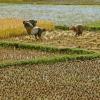
Research conducted by scientists from IIASA and Princeton University suggests that a combination of insurance subsidies and policies that promote “prosocial preferences” ― decision-making preferences that account for community wellbeing ― can help facilitate optimal climate risk management and reduce economic losses.
Smallholder farmers use most of their crops and livestock to feed their own households and usually have few financial protections against the unforeseen costs of climate induced hazards. As climate risks continue to rise, smallholder farms are more likely to experience agricultural losses, resulting from both more frequent and more severe extreme weather events such as flooding, drought, and heat waves.
A new study co-led by Nicolas Choquette-Levy, a postdoctoral associate at Boston University and former participant in the IIASA Young Scientists Summer Program (YSSP) and Matthias Wildemeersch, a researcher in the IIASA Advancing Systems Analysis Program, together with other researchers from Princeton University simulated collective-scale outcomes for smallholder farming communities using economic, risk preference, and drought data from Nepal and Ethiopia. They used a modeling framework based on evolutionary game theory.
The researchers found that communities minimized economic losses when farmers implemented both formal (e.g., insurance) and informal (e.g., revenue sharing and informal lending) risk transfer. The co-existence of multiple risk management strategies effectively shields farmers from extreme outcomes during drought cycles and reduces collective-scale volatility, while also protecting farmers against individual risks, for instance a health shock or an unlucky harvest.
While the social optimum was achieved when farmers implement both formal and informal risk transfer, self-interested households are unable to uphold this combination in the face of rising climate risk.
“Over the past decades, several governments have piloted insurance programs specifically to help smallholder farmers cope with climate-related risks,” explains Choquette-Levy. “While these formal market mechanisms have had some success so far, we were curious about whether they might eventually displace existing informal mechanisms through which farmers already manage risks, such as cooperatives and lending groups. Our research showed that this could become a significant challenge as climate risks get more severe, which will likely drive up insurance premiums. That introduces a temptation for some farmers to abandon insurance and rely on the contributions of insured members of the community, which in turn incentivizes insured farmers to leave their cooperative.”
However, this vicious cycle can be overcome by prosocial decision-making preferences. Prosociality is a decision-making preference where households value the wellbeing of others or work in solidarity with their community to create optimal outcomes. In communities with high levels of prosociality, households diversify their risk transfer mechanisms by participating in revenue-sharing and purchasing formal insurance. The authors found that by cultivating pro-social preferences, governments can make existing insurance subsidies more efficient by addressing both financial and social barriers. In this study, the combination of pairing policies to promote prosocial preferences with insurance subsidies reduced expected farming losses by 26% and saved 5% of community agricultural income through reduced premium subsidies.
Though it might not be realistic to expect high levels of prosocial behavior from a community, even moderate levels of prosociality can lead to outcomes where both formal and informal risk transfers are employed, which is optimal for the community.
“We know that individuals, being farmers, local community leaders, or policymakers, are not entirely self-interested, but also driven by their pro-social preferences,” says Wildemeersch. “We wanted to study the role of these preferences in shaping risk management decisions in farming communities. It is important to account for more realistic ways of decision making to explain the emergence of cooperative behavior. Fostering prosociality through behavioral interventions can play a crucial role in strengthening the resilience of farming communities against the challenges posed by climate risks.”
Reference
Choquette-Levy, N., Wildemeersch M., Santos, F.P., Levin, S.A., Oppenheimer, M., & Weber, E.U. (2024). Prosocial preferences improve climate risk management in subsistence farming communities. Nature Sustainability DOI: 10.1038/s41893-024-01272-3
Adapted from a press release prepared by the Princeton University. Read the original article here.
News

22 July 2024
Are sustainable aviation fuels truly sustainable?

17 July 2024
Forests endure as carbon sink despite regional pressures

16 July 2024

